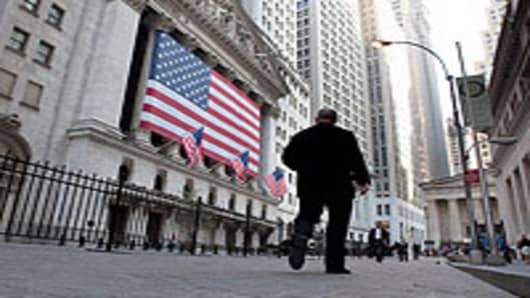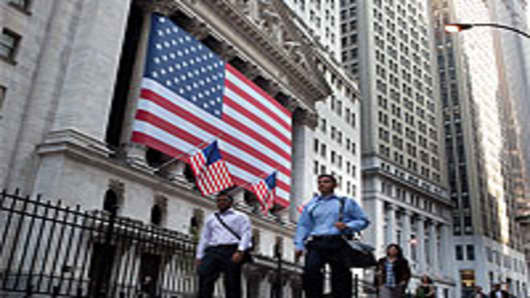Stocks may take a breather after the past week's drama, as investors assess the new political dynamic in Washington and the effects of the Fed's latest effort to pump up the economy.
The weaker dollar will also be a focus as President Obama travels to the G-20 meeting in Korea Thursday and Friday. There is a light economic calendar, and trade and weekly jobless claims are highlights, after the surprise gain in October employment. A number of Fed officials will be out speaking, including Fed Chairman Ben Bernanke, who was to address a Fed conference in Georgia Saturday. General Motors, Cisco, and Disney are among the major companies reporting earnings.
The S&P 500 in the past week jumped 3.6 percent to 1225, and the Dow jumped 2.9 percent to 11,444, a level last seen before the failure of Lehman Brothers in September, 2008. The Nasdaq was also up 2.9 percent to 2578. The dollar index was down 0.9 percent, and the greenback fell 0.8 percent against the euro to $1.4034.
Commodities were winners, with oil up 6.7 percent to a two-year high of $86.85 per barrel. Gold jumped nearly 3 percent to a new high, just under $1400 an ounce, and silver was up 8.9 percent.
"I think the dollar rallies selectively next week," said Boris Schlossberg of GFT Forex. "The dollar probably remains relatively weak against the high beta currencies, like the Australian dollar and the Canadian dollar, but the euro should probably continue to remain weak against the dollar on sovereign debt concerns."
The Fed's announcement Wednesday of a $600 billion quantitative easing package was the main catalyst for markets, but risk assets were also helped by the mid-term election which swept a Republican majority into the House of Representatives.
"We're going to focus on Washington, and hopefully it's going to be constructive," said Jefferies managing director Art Hogan. "The Administration already showed a little bit of flexibility in saying an extension of all the tax cuts is not off the table, and it seems like they want to make a deal if they can extend unemployment benefits as well."
The White House Thursday said President Obama was open to discussing an extension of the Bush tax cuts for all taxpayers. The Obama Administration has opposed extending the tax cuts for the wealthiest Americans. It also supported allowing the capital gains tax to be capped at 20 percent, up from 15 percent, and elimination of the 15 percent dividend tax rate. That would put the dividend tax rate at 39.6 percent for the wealthiest tax payers, if the tax cuts expire.
Improving economic data was also a big focus in the past week but it didn't seem to have much impact on stocks. Friday's surprise report of 151,000 new jobs in October drove the dollar higher, but stocks barely budged. Earlier in the week, ISM manufacturing and services data was also better than expected, showing a renewal of economic activity in the third quarter.
"You have to step back and say how much of this have we factored in," said Hogan. "We spent the months of September and October thinking about all these things. I think it's okay to look at good (employment) news, and say 'this is a much better piece of data' and step back and say 'where do we go from here.'"
U.S. Trust Chief Market Strategist Joseph Quinlan said the mid-term election may have cleared the way for more improvement in the economy. The overtures by President Obama toward business and the potential that he moves more toward the center, could encourage companies to spend and hire. He also said quantitative easing (QE2) and the retention of the Bush tax cuts could take GDP from 2 to 3 percent next year.
"There's a clear sense the economy is accelerating into the New Year," said Quinlan, adding that should help the stock market.
"I think all the pieces are in place to grind higher. We were at (a target of) 1250 (on the S&P) all year. That was a tough sell back in August. We did believe the pieces would come together," he said.
Paul LaRosa, Maxim Group chief market technician, said stocks could be setting up for a shallow sell off, which would be a buying opportunity. The S&P 500, the Dow, and the Nasdaq all closed above their April resistance, but the Russell 2000 has not confirmed the move.
"I wouldn't be surprised if we don't see the Russell 2000 close above 746 in the next week or so. You could have a mild sell off, and you could buy the dips.. We are seeing stuff to buy but it's getting extended now. Many charts are getting extended but it would be right to enter on a pull back," he said. LaRosa said a good level to step in again if there is a pull back would be at 1175 on the S&P 500.
G-20's Dollar Dilemma
G-20's Dollar Dilemma
President Obama faces a potentially surly crowd when he arrives in Korea this week. G-20 members, such as China, Germany and Brazil, have been vocal about their dislike of quantitative easing and its impact on the declining dollar. Countries, like Thailand, South Korea and Turkey, threaten capital controls to stem the flood of too much money flowing too quickly into their economies.
"No one's going to the G-20 with the right mood set, with the dollar declining like it is," said Quinlan. The G-20 has been the key global leadership body, tackling the aftermath of the financial crisis. It was viewed as a a forum that would reflect the new world order by including the emerging world.
If the dollar continues to decline, "it'll be a tough mood" and regardless of what is said at G-20, member countries may continue to implement capital controls and move towards protectionism, Quinlan said. He pointed to the Canadian government's refusal to allow Australian BHP Billiton to buy Potash as a sign of "natural resource protectionism" that could spread.
Robert Sinche, head of global foreign exchange strategy at RBS, said G-20 may make progress on bank reform, but not much else. "I think there will be movement in other areas but global divergence doesn't bring global convergence of policy, and inflation pressures are rising in Asia and deflation risks are alive in the G-4. When you get that kind of divergence, it's going to be hard to find common ground in terms of macro policies," he said.
Quinlan said Obama also clearly heads to G-20 as a weakened leader, after the big Republican win, but he could make points if he brings a trade agreement to the table. "If the U.S. and Korea complete a free trade agreement before President Obama arrives in Seoul, that would be a positive. That would be a good thing that the U.S. is moving forward. We're trying to get this done before he arrives through back channels. If it gets done, it's a big positive," he said.
Another problem that is unlikely to find resolution is China's resistance to a more flexible currency policy. "As the dollar weakens and the peg holds, the Chinese currency gets weaker. A lot of these countries like, Korea, Taiwan, Indonesia, it puts them between a rock and hard place. When the dollar weakens so does the renminbi. So not only are those parties there facing a weaker dollar, they're also losing their competitiveness to the Chinese," Quinlan said.
Sinche said the Chinese had been more amenable to talking about quantitative trade targets than discussing exchange rate flexibility.
"A week ago you would have thought they were heading to something constructive. (Now) the rhetoric out of China surrounding the QE2 announcement is not particularly healthy," said Sinche.. "We saw quotes on the Chinese news that the U.S. is creating another bubble... I heard reports from people visiting China that they no longer call it a global financial crisis. They call it a North Atlantic financial crisis. The Chinese are taking a pretty hard stand that they've gotten this right, and the U.S. had not.
I think maybe when the president looks back on his presidency, I don't think he'd look back on this week and think it was a good one. It wasn't a good one at home, and it won't be a good one overseas," he said.
Earnings, T-Bills and More
Econorama
The Treasury auctions $72 billion in 3-year notes, 10-year notes and 30-year bonds Monday through Wednesday. There is a light economic calendar, and the highlight is on Wednesday when weekly jobless claims are reported. The report is expected early because the bond market is closed on Thursday for Veteran's Day.
"Yes we have supply coming but we have a big buyer," said CRT Capital chief Treasury strategist David Ader. He said the Fed's announcement that it would concentrate in the center of the curve is already affecting the market and resulted in the 7-year outperforming on Friday.
The Fed intends to buy $600 billion in Treasurys by the end of the first half of 2011. The so-called quantitative easing is intended to push lending rates lower and reflate asset prices.
"We have a buy back of just over $6 billion to be done Monday and then the (Fed) announcement Wednesday of buybacks that will be for the next month of $105 billion," said Ader.
Other data expected this coming week includes the NFIB small business survey on Tuesday. There is also wholesale trade that day. On Wednesday, besides claims, there are reports on international trade, import prices and the federal budget. There is no data on Thursday. Consumer sentiment is reported Friday.
Fed officials are also out and about this week, and they will be watched for comments on how they view quantitative easing. Bernanke was to speak Saturday in Jekyll Island, Ga. at an Atlanta Fed meeting. Former Fed Chairman Alan Greenspan speaks at the same event.
St. Louis Fed President James Bullard speaks Monday in New York. His topic is the possibility of a Japanese-style deflationary outcome. Dallas Fed president Richard Fisher speaks in San Antonio Monday on the outlook for the economy, and Fed Gov. Kevin Warsh speaks in New York at a SIFMA meeting.
Atlanta Fed President Dennis Lockhart speaks Thursday on unemployment, and Fed Gov. Daniel Tarullo speaks Friday on the Dodd-Frank Act.
Earnings Central
The wave of earnings reports slows down in the week ahead. On Monday, Frontier Communications, Warner Chilcott, Priceline.com, and Clear Channel Outdoors report earnings.
On Tuesday, watch for General Motors. Covidien, Dean Foods, Marsh and McLennan, Rockwell Automation, Tyco, and Church and Dwight also report that day.
Wednesday's reports include Macy's , Allianz, Computer Sciences, Polo Ralph Lauren and Sara Lee.
Cisco reports after Wednesday's closing bell, as does Advance Auto Parts.
Kohl's , Siemens and Viacom report Thursday morning, and Disney reports after the closing bell.
Friday's reports include Petrobras, J.C. Penney , Agilent and DR Horton .
- Follow me on Twitter @pattidomm.
Questions? Comments? Email us at marketinsider@cnbc.com




